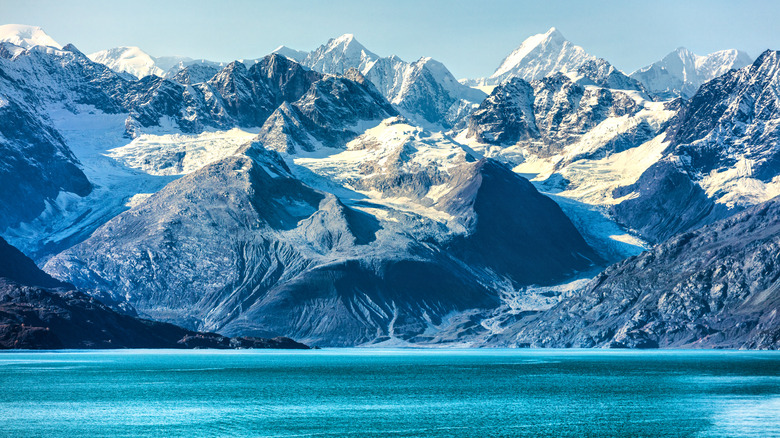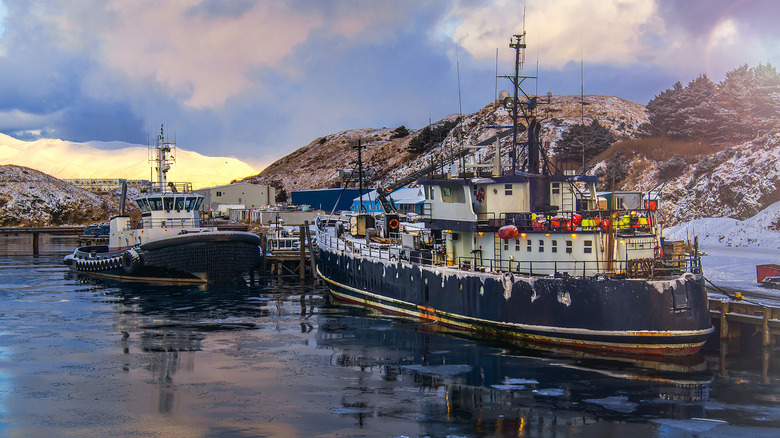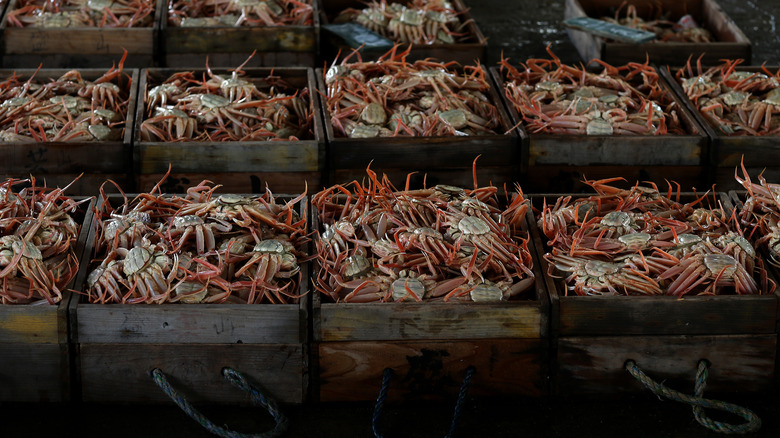Why Alaska's Snow Crab Shortage Is So Scary, According To Scientists
Whether or not you are partial to a delicious plate of butter-drenched crab legs, you should be concerned about the sudden dramatic decline of Alaska's snow crab population. Snow crab numbers have dropped by more than 87% in 2022 (via New Scientist), down from 8 billion to just 1 billion in less than five years. The situation is so dire that Alaskan fishermen will not be fishing for snow crabs at all this winter in order to give the crabs a chance to recover. According to the local regulatory authorities, fishermen are not allowed to catch the crustaceans when their numbers fall below a certain point (via ABC7 Chicago) — thus allowing the population to replenish.
This is very bad news for Alaskan fisheries — the snow crab harvest generated $132 million dollars in revenue in 2020 alone (via NBC News) — but it is potentially much worse news for humankind as a whole. Scientists believe the reduction in numbers is not due to overfishing but instead due to the rapid warming of our arctic oceans.
Warming waters
Although officially, Alaskan fisheries have shut down for the year due to overfishing, fishing itself is not the cause of the sudden drop-off in snow crab numbers (via CNN). Snow crabs have been moving steadily north since the '80s, most likely due to warming waters (via New Scientist). A similar population collapse happened to the red king crab population last year, and this year, the red king crab harvest will also be abandoned yet again.
The sudden disappearance of the crabs has joined a mounting body of evidence that seems to confirm the earth's temperature is warming faster than expected — and the frosty seas around Alaska are particularly vulnerable. In 2019, record-breaking warm temperatures were recorded in the Bering Sea (via NBC News), and scientists have concluded that arctic waters are heating up four times faster than other parts of the ocean (via ABC7 Chicago). National Geographic estimates that summer sea ice in the freezing north may vanish by 2035.
Alaska in peril
News of the collapsing snow crab population has hit social media just weeks before the COP 27 climate conference is due to go ahead, an event at which mass extinctions are sure to be discussed (via the United Nations). Some scientists believe that without drastic action on climate change, the world's seas are likely to go through a mass extinction event over the next few centuries — a disaster that would see countless species disappear forever (via Smithsonian Magazine).
In the U.S., Alaska has been one of the first states to really feel the impact of climate change more generally. Permafrost — the permanently frozen earth which makes up the coldest regions of the world — has begun to shrink in Alaska (via the United States Environmental Protection Agency). The temperature has also climbed by 3 degrees Fahrenheit in the last 60 years, part of a long-term trend that is likely to drastically alter the local ecosystem.
In the more immediate future, many families living in Alaska who make their living from the seas can expect to lose their jobs (via NBC News). According to The Washington Post, many third-generation fishermen are likely to go out of business due to the decline of snow crab numbers.


